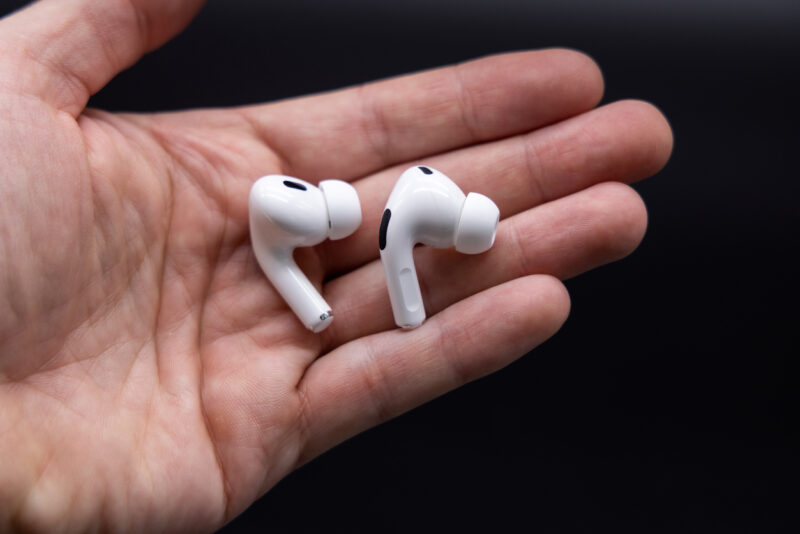One of the most interesting developments in the world of sound and hearing lately has been Apple’s foray into assistive hearing devices. Beyond the headlines, we wanted to look at what these recent developments can offer the millions of Americans who are affected by hearing loss. Many wonder if these popular, and somewhat ubiquitous, devices could really replace traditional hearing aids. While this technological advancement will certainly help to open up a world of sound for many, especially those wary of professional hearing solutions, there are critical differences users should understand.
Let’s examine what Apple’s AirPods Pro 2 can – and can’t – do for those experiencing hearing difficulties.
What’s New: AirPods Pro 2’s Hearing Aid Feature
Apple recently received FDA clearance for a new feature allowing AirPods Pro 2 to function as an over-the-counter hearing aid through iOS 18. This feature targets adults that may be suffering mild to moderate hearing loss and works through self-administered hearing tests within the Health app.
This system provides:
- Basic sound amplification and noise reduction
- Customizable settings managed through the user’s iPhone
- The ability to import previous audiogram results
- An affordable entry point compared to other professional hearing aids
For many, the appeal is immediate. They see a familiar device with added functionality which on the surface appears revolutionary, but understanding the limitations is crucial for those experiencing hearing loss in order to make more informed decisions.
Why AirPods Pro 2 Fall Short as Complete Hearing Solutions
While innovative, these devices have significant limitations when compared to dedicated assistive hearing devices like hearing aids. The most notable difference lies in their amplification capabilities. Professional hearing aids are designed with sophisticated technology that is specifically calibrated to address the various types and degrees of hearing loss. Beyond simply offering stronger amplification, traditional hearing aids are able to be adjusted precisely to your specific hearing needs and lifestyle.
Advanced hearing aids also feature sophisticated feedback cancellation systems that prevent the whistling that is often associated with many over-the-counter devices. They provide multiple listening programs designed for different environments – restaurants, outdoor settings, quiet conversations, or even listening to music – each optimized for those specific acoustic challenges.
AirPods 2, by contrast, have more limited amplification capabilities and fewer customization options, making them suitable only for the mildest hearing concerns. Their noise cancellation technology, while impressive for listening to music, wasn’t originally engineered for hearing assistance.
The Practicality Factor
When it comes to daily use, traditional hearing aids and AirPods differ significantly:
- Battery Life: Traditional hearing aids offer 3-7 days of continuous use versus AirPods’ 6 hours per charge
- Comfort Design: Hearing aids are engineered specifically for all-day wear
- Durability: Medical-grade devices withstand more environmental factors
- Discretion: Modern hearing aids are often less visible than white AirPods
- Connectivity: Modern traditional hearing aids are able to connect to multiple devices simultaneously
For individuals relying on hearing devices for work, social activities and daily communication, these practical limitations can be too much to navigate with AirPods or other over-the-counter devices. The form factor, while stylish, isn’t designed for all-day comfort in the way medical devices are.
The Missing Element: Professional Guidance
Perhaps the most critical difference is the lack of professional guidance or support. When you receive hearing aids through an audiologist, you benefit from:
- Comprehensive hearing evaluations
- Customized fittings
- Regular adjustments as your hearing changes
- Counselling on adaptation and usage
- Ongoing care and maintenance
- Medical evaluations for any underlying conditions
AirPods and other over-the-counter devices can never replace the expertise and personalized care provided by healthcare professionals. Proper diagnosis, fitting, and follow-up care are essential components of successful hearing treatment.
The Hidden Risks of Self-Diagnosis
When hearing difficulties arise, they can stem from various causes – many requiring medical attention. Common medical conditions that can affect hearing include:
- Earwax buildup
- Ear infections
- Perforated eardrums
- Osteosclerosis (abnormal bone growth)
- Ménière’s disease
- Acoustic neuroma
Even typical age-related and noise-induced hearing loss can vary dramatically in pattern and severity. Self-diagnosing with consumer technology also means potentially missing these conditions. Professional hearing evaluations not only measure hearing loss, but can identify when medical intervention might be necessary – something no consumer device can do.
The danger isn’t just in missing a treatable condition. Inadequately addressed hearing loss can lead to social isolation, cognitive decline, and a decreased quality of life. Research increasingly shows connections between untreated hearing loss and dementia risk, making timely intervention all the more important.
When Might AirPods Be Appropriate?
Despite their limitations, AirPods Pro 2 devices with their advanced hearing features might be suitable in specific cases. As a temporary solution while exploring professional options, for example. They may also be suitable for those with very mild hearing difficulties or as a supplemental device for specific environments. AirPods may also be a good option for those not psychologically ready for traditional hearing aids.
The stigma around hearing loss remains a significant barrier to treatment for many people. Using a mainstream consumer product like the AirPods can sometimes be an easier first step. They should, however, be seen as the stepping stone that they are and not a true replacement for proper hearing care. Even in mild cases, professional guidance ensures you’re addressing your hearing needs appropriately.
The Real Value of Professional Hearing Care
Traditional hearing aids represent just one component of comprehensive hearing care. When you work with an audiologist at Associated Hearing, you’re receiving expert diagnosis using advanced equipment to thoroughly evaluate your hearing and identify the specific type, degree, and pattern of your hearing loss.
At Associated Hearing, our approach includes:
- Hearing technology precisely matched to your unique hearing profile and lifestyle needs
- Regular adjustments and reprogramming as your hearing needs change
- Counseling and strategies to help your brain adapt to hearing sounds you may not have heard in years
- Monitoring of your hearing health to prevent further deterioration
- Referrals to medical specialists when necessary to address underlying conditions
It’s this comprehensive approach that makes the difference between devices that sit in pockets and drawers and those that can transform lives. The rehabilitation component is particularly crucial for brain adaptation and speech understanding – a factor that’s often overlooked when considering your hearing healthcare options.
Making the Right Choice for Your Hearing Health
If you’ve been considering AirPods Pro 2 as a hearing solution, we encourage you to first consult with hearing healthcare professionals. A comprehensive evaluation will rule out medical conditions requiring different treatment and allow for discussions of all of your available options.
While technological innovations like Apple’s AirPods Pro 2 represent positive steps toward hearing accessibility, they highlight rather than eliminate the need for professional hearing care. At Associated Hearing, we stay current with all technology advancements and can provide expert guidance on their use.
–Don’t trust something as precious as your hearing to incomplete solutions. Schedule a comprehensive hearing evaluation with our expert team of audiologists to better understand all of your options and take the first step toward better hearing.

